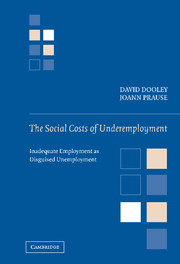Book contents
- Frontmatter
- Contents
- Preface
- 1 Disguised Unemployment and Changing Forms of Work
- 2 The Social Costs of Unemployment
- 3 Data Sources and Methods
- 4 Reverse Causation: Findings on the Selection Hypothesis
- 5 Leaving School: Self-esteem in an Unwelcoming Economy
- 6 Early Adulthood: Alcohol Misuse and Underemployment
- 7 Settling Down: Psychological Depression and Underemployment
- 8 Extending the Employment Continuum: Well-Being in Welfare Transitions
- 9 The Next Generation: Underemployment and Birthweight
- 10 Conclusions
- 11 New Directions
- Appendix A
- Appendix B
- References
- Name Index
- Subject Index
1 - Disguised Unemployment and Changing Forms of Work
Published online by Cambridge University Press: 27 July 2009
- Frontmatter
- Contents
- Preface
- 1 Disguised Unemployment and Changing Forms of Work
- 2 The Social Costs of Unemployment
- 3 Data Sources and Methods
- 4 Reverse Causation: Findings on the Selection Hypothesis
- 5 Leaving School: Self-esteem in an Unwelcoming Economy
- 6 Early Adulthood: Alcohol Misuse and Underemployment
- 7 Settling Down: Psychological Depression and Underemployment
- 8 Extending the Employment Continuum: Well-Being in Welfare Transitions
- 9 The Next Generation: Underemployment and Birthweight
- 10 Conclusions
- 11 New Directions
- Appendix A
- Appendix B
- References
- Name Index
- Subject Index
Summary
Since there can be little doubt that some types of jobs under some modern conditions are psychologically destructive, a controversy has arisen over the question of whether current indicators of social pathology are better explained by prevailing employment conditions or by rates of unemployment.
Jahoda, 1982, p. 43.… a transition is occurring in industrial society from a uniform system of lifelong full-time work organized in a single industrial location, with the radical alternative of unemployment, to a risk-fraught system of flexible, pluralized, decentralized underemployment, which however, will possibly no longer raise the problem of unemployment in the sense of being completely without a paid job.
Beck, 1992, p. 143.INTRODUCTION
The Paradox
A funny thing happened on the way to economic utopia. At the turn of the millennium, Americans were enjoying an economic expansion of record length that had begun in 1993. But a shadow hovered over the celebration of rising stock prices and falling unemployment rates. It was not the obvious fear that the next economic bust was lurking around the corner. Of course, there was a contraction in 2001, even before the September 11 terror attacks. But along with the threat of recession, there was a rising suspicion that even the best of economic times are somehow flawed. The conventional wisdom assumes that an economy that minimizes unemployment must be good.
- Type
- Chapter
- Information
- The Social Costs of UnderemploymentInadequate Employment as Disguised Unemployment, pp. 1 - 15Publisher: Cambridge University PressPrint publication year: 2003



